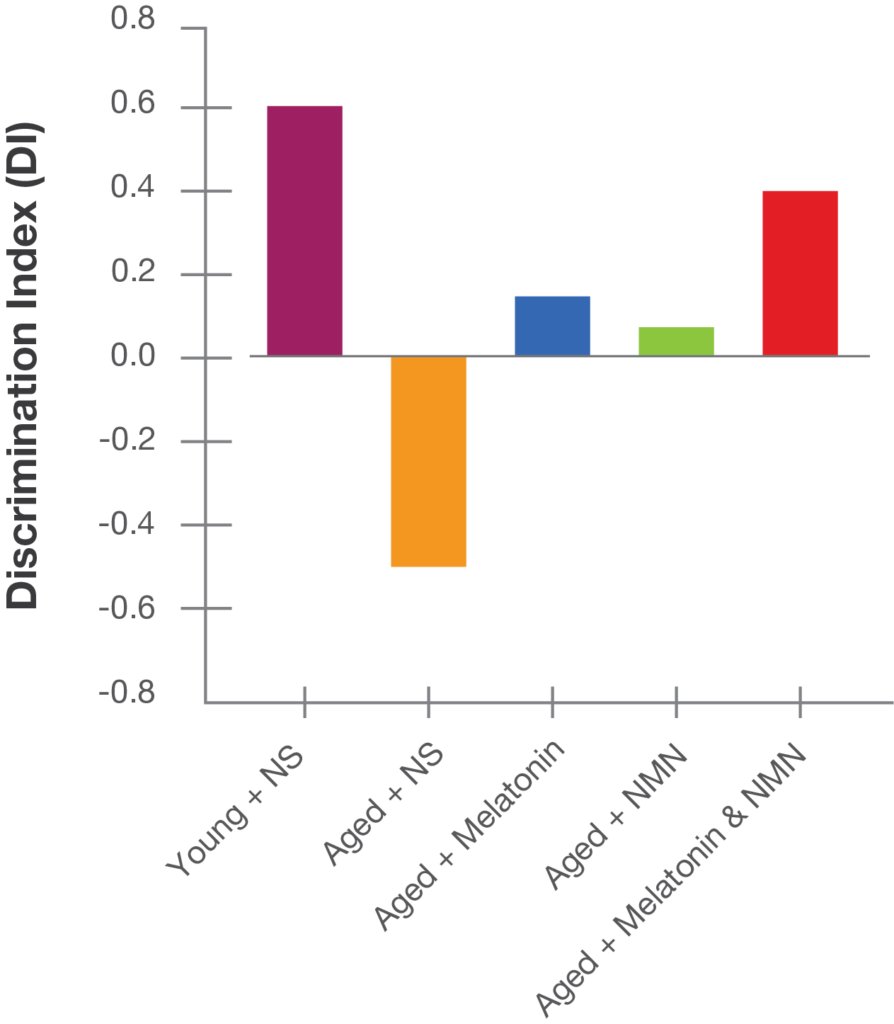NMN and Melatonin Can Improve Cognitive Impairment in Aged Rats
Iranian scientists improve age-related cognitive impairment in rats by administering nicotinamide mononucleotide (NMN) and melatonin.
Cognitive deficits and impaired memory relate closely with age over time According to research, events such as apoptosis, cell death and damage to the mitochondria contribute significantly to age-related learning and memory deficits.3,4,5 Under such circumstances, free radicals which have excess atoms or molecules with unpaired electrons reduce levels of energy molecules, ATP. Alterations in permeability of the mitochondria result in cell death by apoptosis in structures of the brain.3,6
Research on nicotinamide mononucleotide (NMN), an essential precursor of nicotinamide adenine dinucleotide (NAD+), indicates this molecule reduces death of neurons and reduces generation of free radicals. NMN administration also improves cognitive impairments in animal models such as rats.3,8,9 Scientists demonstrate melatonin supplementation improves learning and memory2,3 and decreases levels of free radical generation and cell death by apoptosis in animals as well.1,3 This study aims to examine the effects of melatonin and NMN separately and administered together.

Image from Hosseini et al., (2019)
NMN and Melatonin Additively Enhance Cognition
In the study, the scientists split forty aged and ten young male rats into five groups. The groups consist of young rats receiving normal saline treatment, aged rats receiving normal saline treatment, aged rats receiving melatonin treatment, aged rats receiving NMN treatment, and aged rats receiving a combination of melatonin and NMN treatment. For experimentation, the rats adapt to their environment for five days, receive treatment every other day for the next 28 days, undergo behavioral testing for 10 days, and then undergo sampling and molecular testing for two days (see image of experimental design above).

Figure from Hosseini et al. (2019)
Results of the study indicate melatonin and NMN treatments significantly improve recognition of objects previously encountered (recognition memory) in aged rats compared to aged rats without these treatments. Also, as indicated in the image above, aged animals treated with melatonin, NMN, or a combination of melatonin and NMN perform significantly better in discriminating new from old, previously-encountered objects than aged animals without these treatments. The scientists obtained this measurement by measuring the time spent with a new object compared to old, previously-encountered objects. Longer periods of time spent around a novel object indicate the animal does not remember the object but does remember familiar objects which he encountered previously. Young animals perform significantly better than old animals. A combination of melatonin and NMN treatment yields a significantly greater improvement compared to either treatment alone in aged, male rats.

Figure from Hosseini et al. (2019)
The study provides data indicating free radicals increase in aged compared to young rats. Treatment of aged rats with melatonin, NMN, or a combination significantly decreases the levels of these free radicals in neurons. The scientists demonstrate also significantly increased ATP levels in the prefrontal cortex and hippocampi of aged rats with melatonin treatment, NMN treatment, or combination treatment. With measurements of mitochondrial membrane potential, experimentation from the study indicates increased membrane potential with melatonin, NMN, or combination treatments in comparison to aged rats without the treatment. The experimentation on mitochondrial membrane potential demonstrates a reduction in mitochondrial dysfunction and permeability with NMN, melatonin, and combination treatments.
The study provides interesting findings, because previous research has linked mitochondrial dysfunction to reduced cognitive abilities in aging.7 Studies have also implicated improvements in cognitive abilities during aging with NMN administration or melatonin supplementation. This study raises the possibility of improved cognition during aging through reduced mitochondrial dysfunction and reduced levels of cell death through apoptosis with NMN and/or melatonin treatment.
“Separate administration of melatonin, NMN and/or their combination improved cognitive abilities and attenuated mitochondrial dysfunction and apoptosis both in PFC and HIP of aged rats,” say the authors. “Nevertheless, further studies should be done to reveal their exact procognitive mechanisms.”3

